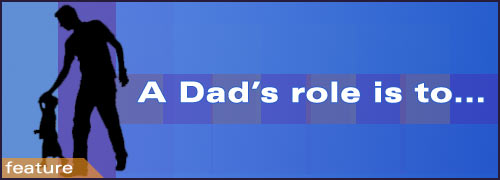
At a recent workshop for parents, the topic of discussion was the Chinese tiger mother’s methods which everyone has been so excited about lately. I raised a question about the use of strict authority with children as compared to the American belief in freedom. One of the fathers spoke up first and immediately transferred the question to the workplace. He said he saw it as using the carrot and the stick and explained further that it would be impossible to use only the authority of the stick in today’s work world. To be successful you would also need the carrot.
Looking at child rearing methods in terms of the workplace is a wonderful contribution – a kind of reality check. Too often we look at interactions with children as something separate and different from the rest of life. Yet the way we as adults interact with others in many different areas – work, family, friendship – is profoundly influenced by the way we have been taught to interact with others as children.
The role of fathers in that teaching has certainly changed over the last number of years. The increased participation of fathers in child-care (at times coerced) is all to the good. But there has been so much emphasis on men generally needing to become more sensitive and nurturing, and especially in their role as fathers that I wonder if something hasn’t been lost along the way.
It has been noted that with women increasingly in the workplace, they have made a valuable contribution because of particularly feminine characteristic ways of relating to others and approaching problems. Yet we haven’t sufficiently valued the inherently male characteristics that can be brought to child-rearing. It sometimes seems as though we are trying to turn fathers into auxiliary mothers – all estrogen and no testosterone.
Of course no one wants to return to the old role of father as the big stick – “Just wait until your father comes home”. Mother as the carrot and father as the stick is not the message we want to give our children. But acting as a calm authority often seems to come more easily to fathers than to mothers. Mothers many times fault themselves for becoming too emotional in interactions with their children. (No reinforcing of stereotypes intended.)
A mother I know, who understands her children and relates to them very well, described how her husband is much better than she is in handling certain situations. For example, when her son acts up in a restaurant, his behavior escalating, her husband is able matter-of-factly to take him out of the situation without becoming punitive or judgmental. He is able to be in charge when she gets too upset by their child’s behavior.
It is dangerous to generalize, so the point is not that fathers are always better at one thing and mothers always better at another. Instead, we need to respect and value gender differences rather than seek to obliterate them. If we can do that with each other, our children stand to benefit – as do we!
Dr. Elaine Heffner is a psychotherapist and parent educator in private practice in New York City, and a Senior Lecturer of Education in Psychiatry at Weill Cornell Medical College. To learn more about the extensive work of Dr. Heffner, please visit her site:




